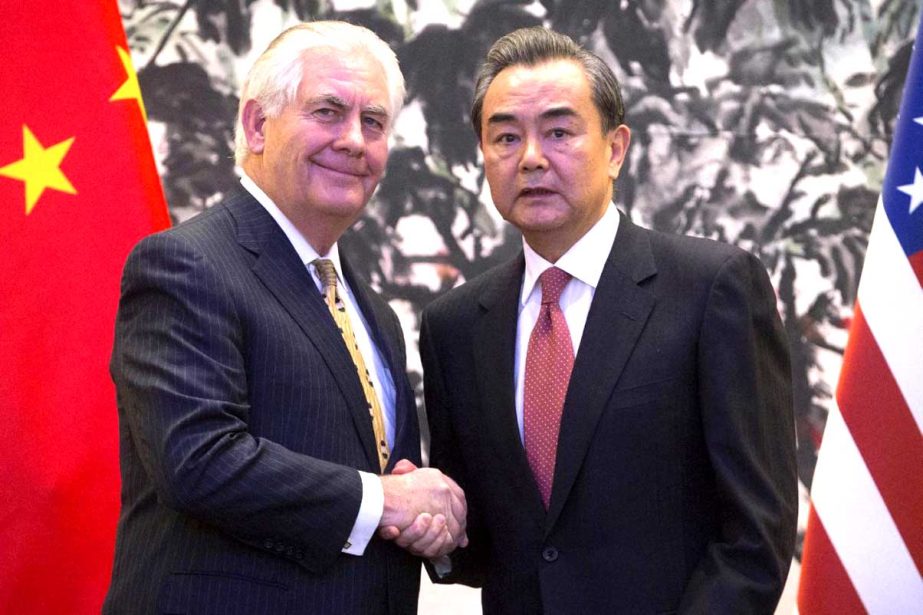
AP, Beijing :
US Secretary of State Rex Tillerson on Saturday pushed for closer China-U.S. cooperation on dealing with North Korea’s nuclear programme in his first face-to-face talks with top Chinese diplomats.
Tillerson’s visit to Beijing followed his remarks in South Korea on Friday in which he warned that pre-emptive military action against North Korea might be necessary if the threat from its weapons program reaches a level “that we believe requires action.”
China, the North’s biggest source of diplomatic support and economic assistance, hasn’t responded directly to his remarks, although Beijing has called repeatedly for all sides to take steps to reduce tensions.
Tillerson stressed the need for a “results oriented” relationship with China in comments following his meeting Saturday with Foreign Minister Wang Yi.
“We renewed our determination to work together to convince North Korea to choose a better path and a different future for its people,” Tillerson said.
He said Wang agreed on the need for a “course correction” with Pyongyang. Bringing North Korea “to a different place” is a matter to be approached with “a sense of urgency,” Tillerson said.
Wang restated Beijing’s calls for dialogue between the U.S. and North Korea and called Tillerson’s visit an important step toward a meeting between Chinese President Xi Jinping and his U.S. counterpart, Donald Trump, expected next month.
Tillerson met later with Yang Jiechi, Xi’s top foreign policy adviser. He is scheduled to meet with Xi on Sunday morning before returning to the U.S.
As North Korea’s most important source of diplomatic support and economic assistance, China has grown increasingly concerned about the possibility of conflict on the Korean Peninsula.
Wang warned last week that North Korea on one side, and the U.S. and South Korea on the other, were like “two accelerating trains” headed at each other, with neither side willing to give way.
He floated a proposal that North Korea could suspend its nuclear and missile activities in exchange for a halt in joint U.S.-South Korea military drills. That was swiftly shot down by the U.S. ambassador to the United Nations, Nikki Haley, who said Washington has to see “some sort of positive action” from North Korea before it can take leader Kim Jong Un seriously.
While China has agreed reluctantly to U.N. Security Council resolutions sanctioning North Korea, it is adamantly opposed to measures that might bring about a collapse of the North Korean regime and send waves of refugees into northeastern China while South Korean and American forces take up positions on its border.
That’s left Beijing with few options other than to call for renewed dialogue under the Beijing-sponsored six-nation format that broke down in 2009.
In a further sign of its frustration with Pyongyang, China last month banned imports of North Korean coal for the rest of the year, potentially depriving Kim’s regime of a key source of foreign currency.
On Friday, Tillerson signaled a tougher strategy toward North Korea that leaves open the possibility of pre-emptive military action.
“Let me be very clear: The policy of strategic patience has ended,” he said after visiting the heavily militarized border between the rival Koreas. “We are exploring a new range of diplomatic, security and economic measures. All options are on the table.”

